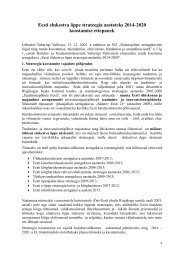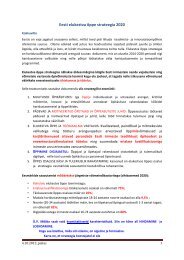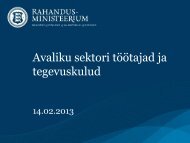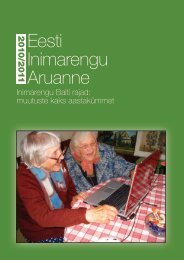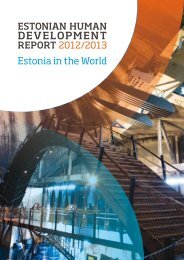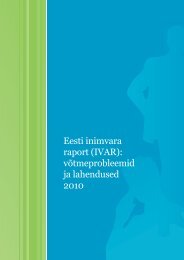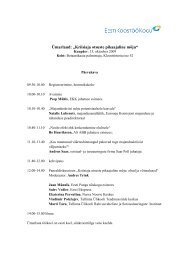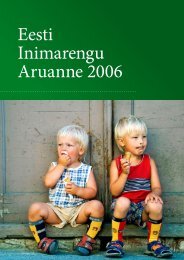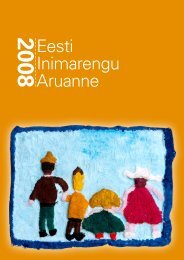Estonian Human Development Report
Estonian Human Development Report - Eesti Koostöö Kogu
Estonian Human Development Report - Eesti Koostöö Kogu
You also want an ePaper? Increase the reach of your titles
YUMPU automatically turns print PDFs into web optimized ePapers that Google loves.
olds considered themselves to be part of the <strong>Estonian</strong> people,<br />
57% of the 15–29-year-old respondents answered this question<br />
in the affirmative. At the same time, having citizenship<br />
does not have a greater than average impact on the attitudes<br />
of the young people – similarly to all <strong>Estonian</strong> citizens with<br />
Russian-speaking backgrounds, every third young <strong>Estonian</strong><br />
citizen whose native language is Russian does not consider<br />
him- or herself to be part of the <strong>Estonian</strong> nation 23 . Therefore<br />
the society should pay more attention to attitudinal barriers<br />
that do not allow people who were born and have grown up<br />
in Estonia feel that they really belong here.<br />
Evaluations of Estonia’s citizenship policies also vary<br />
dramatically by ethnic group. The findings of the 2008 survey<br />
show that two-thirds of <strong>Estonian</strong>s feel that Estonia’s<br />
current citizenship policies are “normal and correspond to<br />
international standards”, while 15% feel that the citizenship<br />
policies are too lenient and damage the interests of the <strong>Estonian</strong><br />
people. On the other hand, 77% of the Russian-speaking<br />
population believe that the current citizenship laws are<br />
unjustly strict and restrict human rights. However, there<br />
are almost twice as many people in the younger Russian age<br />
group (15–29) compared to the 50–74-year-old group who<br />
feel that <strong>Estonian</strong> citizenship policies conform to international<br />
standards (20% and 11.5% respectively).<br />
In sum, the data shows that despite progress in naturalization,<br />
the political community in Estonia continues<br />
to be ethnically split.<br />
Support for democracy<br />
as a form of government<br />
Based on survey findings, the citizens of “old” democracies<br />
feel almost unanimously that democracy is the best possible<br />
form of government (Klingemann 1999). The positions<br />
of the populations in post-Communist transition countries<br />
regarding this question have been notably more diverse.<br />
Painful social changes created nostalgia among certain segments<br />
of the population for the old order or the desire for a<br />
strong leader who would set the house in order.<br />
The findings of the New Baltic Barometer survey series<br />
(Rose 2005) show that during the transition decades a significant<br />
part of the <strong>Estonian</strong> population preferred an authoritarian<br />
order to a democratic one. For instance, in 2004 only<br />
46% of <strong>Estonian</strong>s and 39% of the local Russian-speaking<br />
population were convinced that democracy is preferable to<br />
other forms of government. Of <strong>Estonian</strong>s, 18% and of Russians,<br />
29% think that in certain cases an authoritarian order<br />
could be better. A quarter of the respondents were indifferent<br />
about this issue. According to the findings of the same<br />
survey, a quarter of <strong>Estonian</strong>s and more than a third of the<br />
Russian-speaking population agreed with the following<br />
statement: “is it best to get rid of parliament and elections<br />
and have a strong leader who can quickly decide everything.”<br />
Among the Russian-speaking population in Latvia<br />
and Lithuania, the yearning for “strongman rule” has been<br />
even greater, as the statement was approved by almost half<br />
of the respondents in some years (Ehin 2007).<br />
Questions about how attached the <strong>Estonian</strong> population<br />
is to the principles of democracy are also important today.<br />
The enlargement of the European Union and NATO did<br />
not bring about a liberal-democratic “end of history”. The<br />
deepening conflict of values between the West and Russia is<br />
manifested in a political and ideological contestation over<br />
the meaning of democracy. The Kremlin’s doctrine of “sovereign<br />
democracy” assigns content to the concept of democracy<br />
that has very little in common with the definition used<br />
in the West. The existence of different information fields for<br />
the <strong>Estonian</strong>s and the Russian-speaking population (<strong>Estonian</strong><br />
<strong>Human</strong> <strong>Development</strong> <strong>Report</strong> 2007, Chapter 3.7) creates<br />
a fertile ground for the emergence and acceptance of<br />
multiple, competing definitions of democracy in Estonia.<br />
Satisfaction with regime performance<br />
Comparative studies have shown that satisfaction with the<br />
functioning of the political regime has continually decreased<br />
in the democratic societies of the developed Western countries<br />
during the last half-century. It seems that improved educational<br />
opportunities, greater awareness and political information<br />
have led to an erosion of the traditional deferential<br />
attitude toward power and rulers, which has been replaced by<br />
a notably more critical and cynical attitude (Dalton 2004).<br />
One cannot speak about similar declining trends in the<br />
post-Communist countries. During the transition years, the<br />
satisfaction of Eastern Europeans with state authority followed<br />
a U-shaped curve (Munro 2002). The euphoria of the<br />
Velvet Revolution era subsided quickly and gave way to dissatisfaction<br />
that was fed by the deterioration in living standards,<br />
unemployment, inflation, an increase in crime and<br />
other painful consequences caused by the restructuring of<br />
the economy and political reforms. Along with improvements<br />
in living standards and the growth of political stability,<br />
satisfaction with the regime also started to increase again.<br />
A similar U-shaped trend is also apparent in the Baltic countries.<br />
Overall, the <strong>Estonian</strong> population has been considerably<br />
more satisfied with their political regime during the entire<br />
transition period than the populations of Latvia or Lithuania.<br />
At the same time, ethnic <strong>Estonian</strong>s and Latvians assess the<br />
performance of their political systems much more positively<br />
than the Russian-speakers in these countries (also see the<br />
previous subchapter of the <strong>Human</strong> <strong>Development</strong> <strong>Report</strong>).<br />
Large gaps between the regime assessments of various<br />
ethnic groups are also noticeable now. A survey study conducted<br />
in the spring of 2008 (State Chancellery 2008b) show<br />
that 62% of ethnic <strong>Estonian</strong>s trust or tend to trust the <strong>Estonian</strong><br />
state while only 23% of the Russian-speaking population<br />
does (Table 4.4.2.). There are no significant age-related<br />
differences in the evaluations of the Russian-speaking population<br />
regarding the trustworthiness of the <strong>Estonian</strong> state,<br />
although the 15–29-year-old respondents seem to be somewhat<br />
more critical toward the state than those who are middle-aged<br />
or older. Surprisingly, Russian citizens tend to<br />
trust the <strong>Estonian</strong> state more than those Russian-speakers<br />
who are <strong>Estonian</strong> citizens (see Table 4.4.2.). This can be<br />
explained by reference to age differences of the corresponding<br />
citizen groups: while younger and middle-aged people<br />
dominate among Russian-speakers with <strong>Estonian</strong> citizenship,<br />
the majority of Russian citizens are pensioners who<br />
are apparently satisfied with the social security provided to<br />
them by the <strong>Estonian</strong> state (see Lauristin 2008).<br />
Earlier studies have shown that among minorities,<br />
satisfaction with regime performance is more strongly<br />
23<br />
On the other hand, among the middle-aged group, citizenship brings about stronger idetnfification with the <strong>Estonian</strong> people – 72% of<br />
Russian speakers aged 40–49 with <strong>Estonian</strong> citizenship define themselves as members of the political commmunity.<br />
| 92



